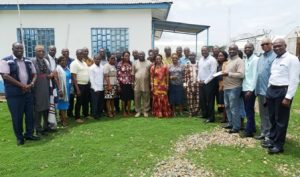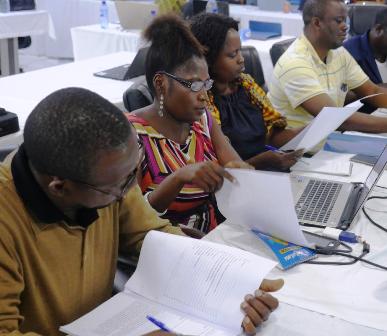Sierra Leone pioneers pre-service, in-service courses in Disease Surveillance, International Health Regulations in Africa
-
To commence implementation next academic year in October

Photo: WHO Africa Region
Sierra Leone is on track to become a model in Africa to meet the challenge of health emergency response by preparing its health workforce to detect, prevent, control and effectively respond to public health emergencies in the country.
The country has seen a huge transformation and improvement in its public health surveillance capacity following the devastating Ebola outbreak in 2014-2016. Core capacities and infrastructure have been developed and strengthened. In June this year the country became the first in Africa to have a fully functional electronic disease surveillance and response system that allows health workers to collect and immediately report priority health information to the national level from every public health facilities nationwide.
Now, the country is set to introduce Integrated Disease Surveillance and Response (IDSR) and the International Health Regulations (IHR) 2005 into health personnel training curricula. The initiative, which is being piloted with the support of the World Health Organization (WHO) in Sierra Leone and Tanzania, aims to strengthen local institutions to contribute to the sustainability of national public health surveillance and response.
Health authorities and experts from the Ministry of Health and Sanitation, universities, colleges and other health training institutions in collaboration with WHO have developed and validated the pre-service and in-service curricula to help facilitate the process. These experts are also providing technical guidance on implementation modalities of the initiative.
With everything now fully set in motion, Sierra Leone hopes to commence implementation of the initiative at the beginning of the next academic year in October 2019.
“Highly skilled human resources for health are critical for improving health security. However, the traditional in-service training for surveillance alone is not effective enough to build and sustain national IDSR-IHR capabilities. This is why WHO is supporting the country to institutionalize pre-service training and continuous professional education,” says Mr Evans Liyosi, WHO Country Representative in Sierra Leone.
This is the first time such initiative is being introduced into the curricula of tertiary institutions which also offer students the opportunity to take courses in IDSR and IHR 2005 at different levels. The curricula have been developed to meet the needs of medical, nursing, veterinary, laboratory, environmental health, para-medical, public health, epidemiology, health information, health management, and health education skills as well as faculty and course content developers and administrators.
The International Health Regulations 2005 require State Parties to develop minimum core public health capacities to detect, assess, notify and respond to public health events and hence strengthening national and global health security.
“Essentially, improved surveillance infrastructure and competent frontline personnel is important in disease prevention and control and in enhancing health security,” says Dr Charles Njuguna, Lead for Health Security and Emergencies at the WHO Country Office in Sierra Leone.
Current health training curricula focus mainly on clinical and technical skills even though the personnel would eventually be deployed in districts to assume roles for disease prevention and control, usually with little public health knowledge, priority disease detection and response skills competencies. However, with this initiative Sierra Leone is set to become a pioneer in Africa where health workers would be familiar with what to expect in public health surveillance even before deployment.

